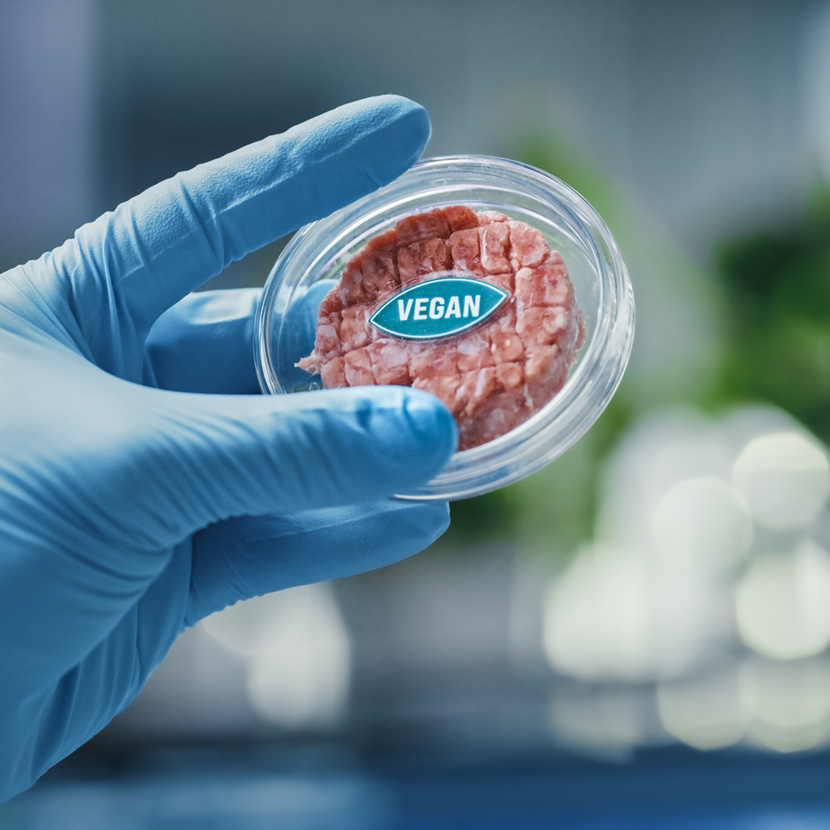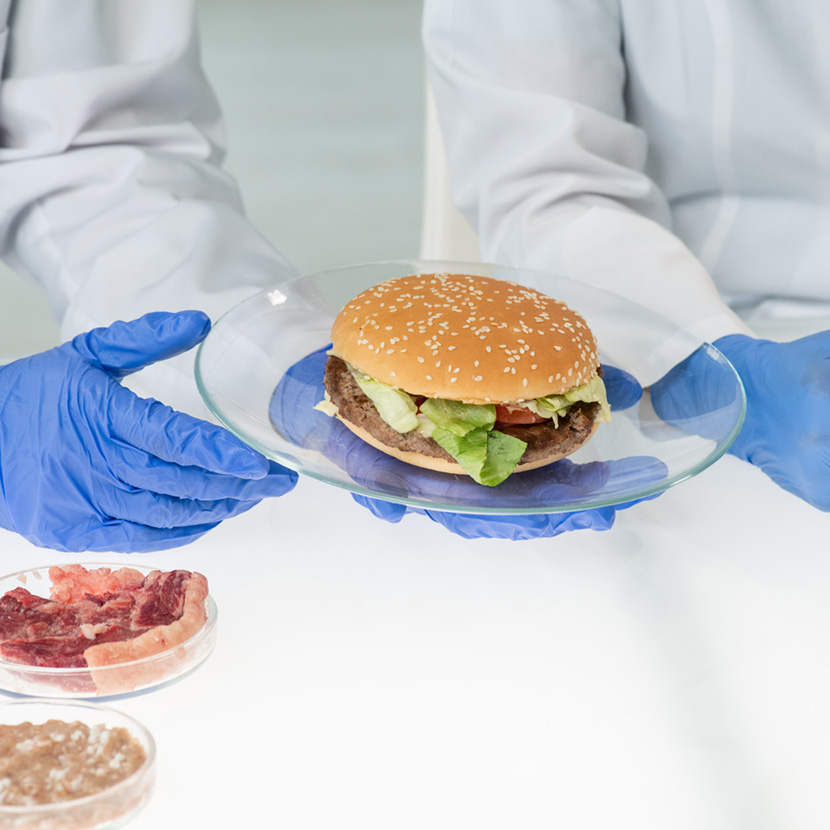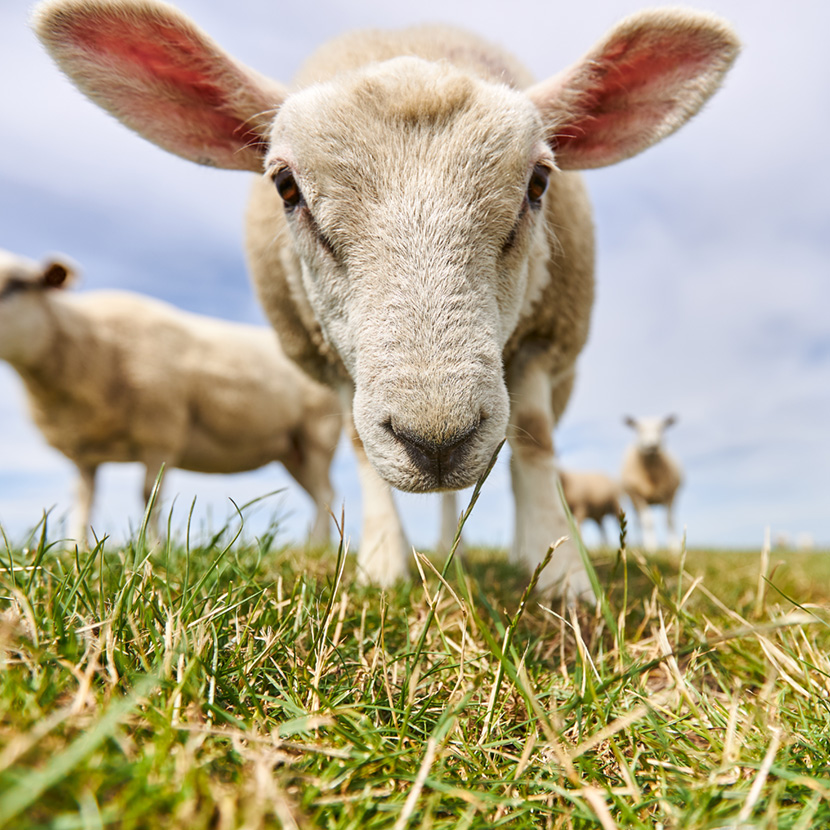V-STORY
Lab-grown meat – is it vegan?


Cultivated meat – a blessing or an abomination?
In a world that’s hanging in the balance between tradition and innovation, lab-grown meat is stirring up a variety of emotions. But what is it actually? The basic idea is simple, but that’s precisely why it has the most cutting-edge technology behind it. Lab-grown meat, also referred to as cultivated meat or in-vitro meat, is created by cultivating meat from animal cells. The cultivated meat grows from the stem cells in the animals’ muscle tissue through the intake of nutrient solutions consisting of sugar, amino acids, fatty acids, but also vitamins and minerals.
While the first cell-culture meatball was a sensation ten years ago, cultivated meat is now being produced on an industrial scale, but only in a few countries so far. Where will it all lead?
Given the challenge of ensuring food supply for an ever-growing global population, this subject is as topical as it is controversial. This brings us to the burning question: is cultivated meat the next big breakthrough or just a scientific gimmick? Are we to turn our attentions to meat grown in petri dishes – as opposed to in fields?




For lab-grown meat: high-five for science!
On one side of the debate there are visionary individuals who go as far as to suggest lab-grown meat could be our planet’s saving grace. The production process, which looks as if someone has mistaken a cookbook for a chemistry set, holds out the prospect of enjoying meat without animals having to be slaughtered, forests cleared, fishing stocks depleted or vast amounts of water wasted. This has given rise to a preference for the name “clean meat” and a perceived genuine benefit for the environment and our consciences.
Research teams worldwide – from Tufts University in the USA right through to start-ups in Israel, the UK, China, the Netherlands and Germany – are working on making this technology accessible and affordable. Imagine, one day soon, sushi and steak arriving on your plate without any animals having to die for it.
Against lab-grown meat: but is it still natural?
On the other side of the debate are those with a more puristic or sceptical mindset, who ask: „Does science really have to interfere in every recipe and isn’t it all a bit Frankenstein?” They pose ethical questions and voice concerns with regard to the naturalness of our food. The idea of our dinner coming from a lab instead of a field will feel strange for many initially. Despite the advances and potential of lab-grown meat, questions remain with regard to the animal constituents used and the long-term impact on our health and diet.

The future is still unwritten

While some countries like Singapore (since 2019) and the USA (since 2023) have already paved the way for the sale of lab-grown meat, some people are still sitting on the fence, sceptical or have adopted a wait-and-see attitude. But there are already a number of companies active in the field of New Food. For instance, companies like Good Meat, Upside Foods, Mosa Meat from the Netherlands, Aleph Farms in Israel or Bluu Seafood from Lübeck in Germany produce cells from cattle, chicken and salmon. The first approval procedures are already underway in the EU and the first tastings were recently authorised in the Netherlands and Iceland. Some companies are experimenting with producing complex dishes like steak or tuna fillets either by hand or using a 3D-printer. While France is researching cultivated foie gras, Italy has presented draft legislation aimed at banning this technology. Decisions are likely to be made in the EU commission.
The discussion around lab-grown meat echoes general debate about sustainability, ethics and the future of our food. And then there’s the other question that hovers over everything: Can and should lab-grown meat be deemed vegan? While some welcome the chance to minimise animal suffering, others insist on the purity of the vegan philosophy. As long as animal cells as involved, the term plant-based doesn’t apply.
A 2023 survey conducted by Statista Consumer Insights shows varying willingness to try cultured meat. It found that in UK, where, according to the Good Food Institute Europe, there are over 20 cultured meat companies, 17% of respondents expressed interest in trying lab-grown meat (in Germany it is 15%), while in France it is only 9%.
In countries like France and Italy there are movements opposed to this technology. However, other recent surveys (by YouGov) reveal that 65% of those surveyed in Germany endorse this food technology as a viable option – on the condition that it be classed as nutritionally harmless and safe.
A vegan dilemma – or is it?
But for all those who follow a vegan lifestyle in the interests of animal welfare, there’s one crucial question: Can lab-grown meat be deemed part of a vegan diet? This is a difficult question and a source of heated debate within the vegan community. At first glance, lab-grown meat offers a fascinating alternative: no animals have to suffer or die for this meat. A clear win-win situation for anyone forgoing animal products for ethical reasons, right?
But a closer look reveals a more complicated picture. The production process starts with an animal cell. What’s more, current lab-grown meat production methods frequently use animal constituents such as the nutrient solution in which the cell cultures grow. This practice goes against the basic principles of veganism, which rejects the use of animals and animal products. Some producers are in the process of developing plant-based culture media, which would shed a different light on the subject.
So, the discussion around lab-grown meat and veganism isn’t just a question of technology, but also one of principle. While some vegans welcome the development because it has the potential to minimise animal suffering, others insist that only a diet which is completely free of animal products can truly be vegan. This applies all the more so to those whose primary motivation for leading a plant-based lifestyle is more rooted in health.

This debate demonstrates how deep veganism extends or has the potential to extend as a life philosophy. It reveals that the decision as to what ends up on our plates is always a question of individual values and personal ethics, too. In future, lab-grown meat could build a bridge and enable a new form of ethical consumption. But, until then, the question as to whether or not lab-grown meat is vegan remains an open topic of discussion, fuelling reflection and debate.
Lab-grown meat pros and cons
PROS
• Animal welfare: Reduced animal suffering because less animals need to be killed for meat production.
• Environmental benefits: Less land, water and energy consumed; potential for reduced greenhouse gas emissions in comparison to traditional livestock breeding.
• Research and innovation: Advances in science and technology are contributing to lowering costs and establishing lab-grown meat as a practical alternative to lab-grown meat.
• Reducing intensive farming: Long-term potential for reducing the need for intensive factory farming.
CONS
• Ethical concerns: Use of nutrient solutions containing animal constituents like foetal bovine serum, which calls into question whether the production method is free from animal suffering.
• Technological and financial challenges: High costs and the need to cultivate cells in three-dimensional supporting structures make market entry more difficult.
• Health concerns: Lack of clarity concerning the impact of consumption of lab-grown meat on human health.
• Environmental disadvantage: At the moment, cultivated meat has an energy balance that is less favourable than that of real meat.
• Market acceptance: Varying societal acceptance and willingness to consume lab meat.
An inconclusive conclusion
So here we stand at the buffet of the future, unsure as to what should feature on our menu. Lab-grown meat is a fascinating example of how science and technology challenge the way we think about food and ethics. A promising concept, but one that poses a number of questions that need answering first. In Europe, the Novel Foods Regulation guarantees that the topic will be reviewed carefully with regard to safety.
Ultimately, the decision as to whether or not lab-grown meat will be part of our future remains a personal choice – a choice based on knowledge, ethics and may a little curiosity.
Recipes
As long as so many questions remain unanswered and there are sufficient alternatives, we prefer to cook with our plant-based products. Here you’ll find a section of delicious recipes with meat alternatives:



Sources:














